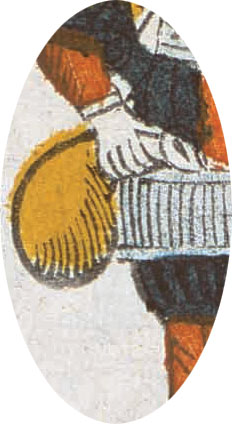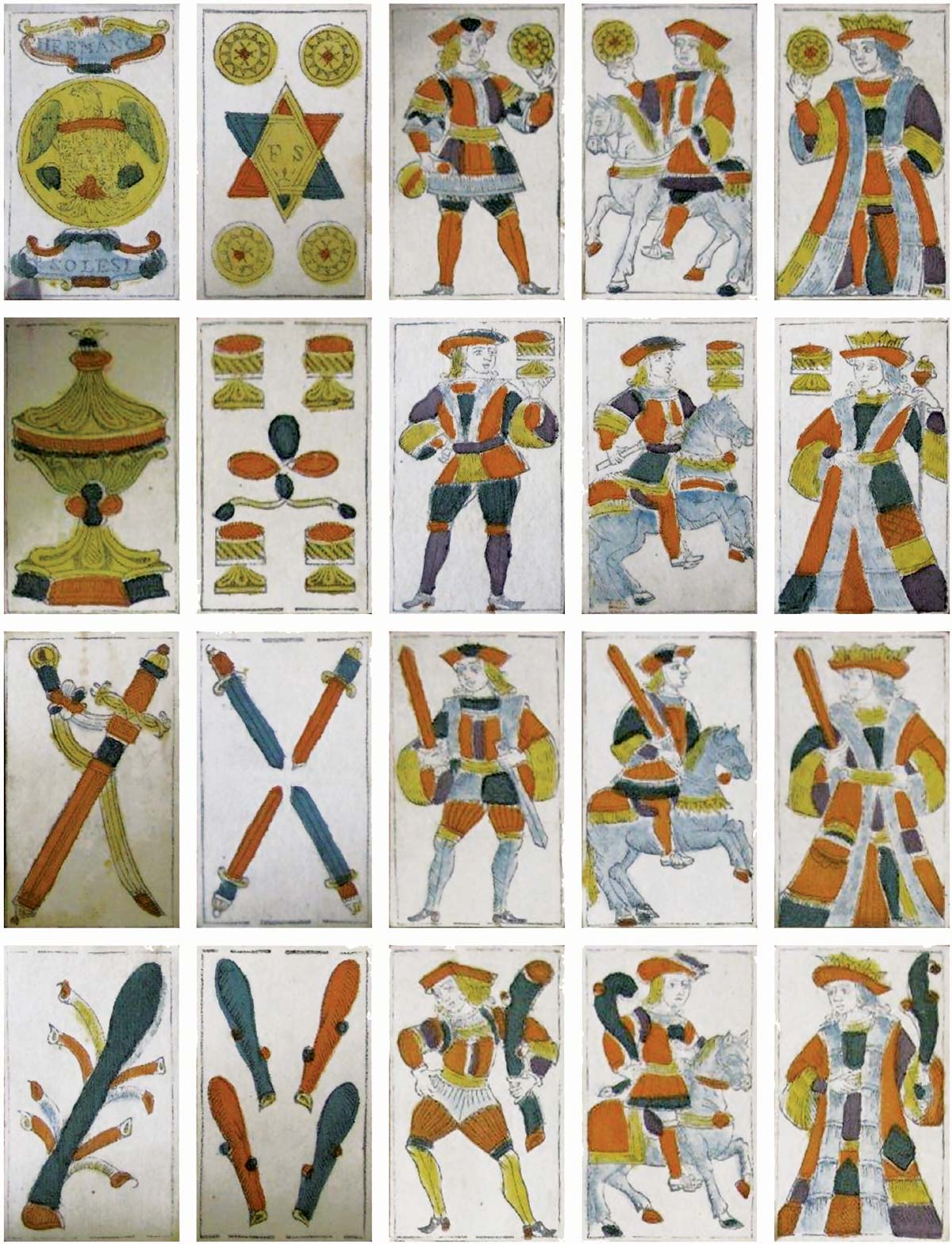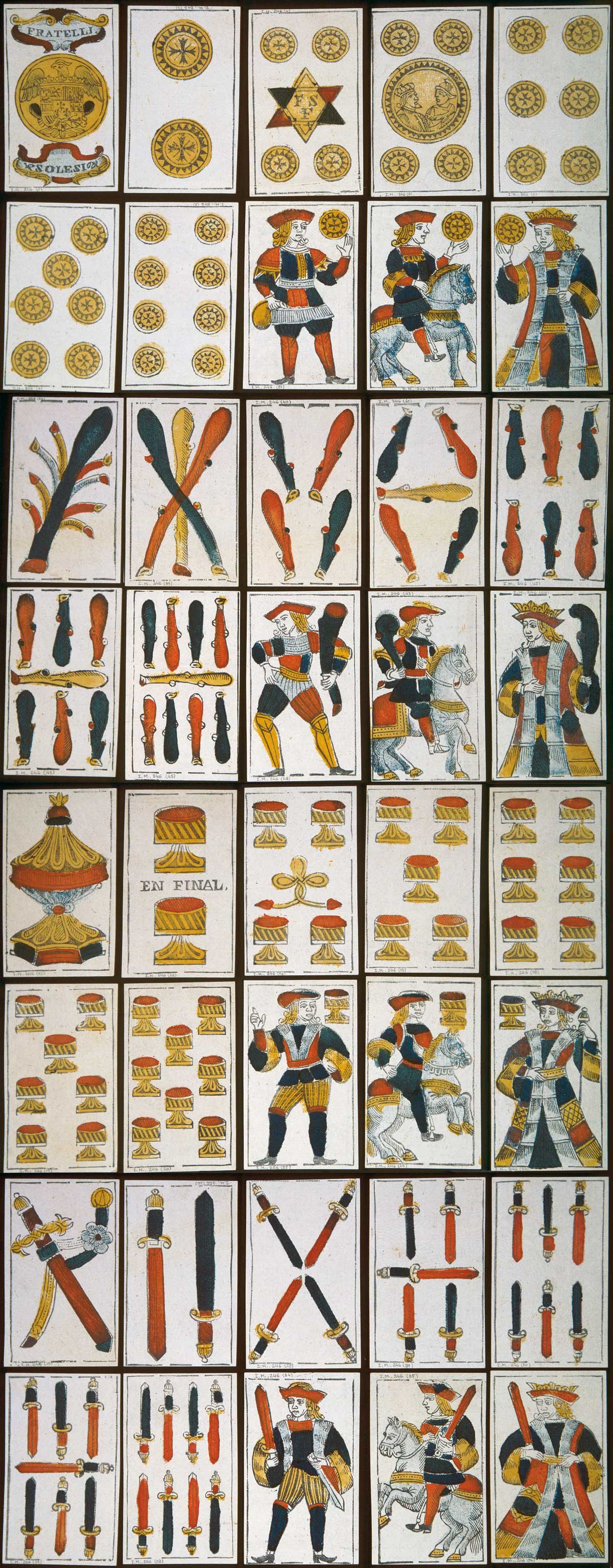Hermanos Solesio
“Money Bag” pattern by Hermanos Solesi, late 18th c.
Spanish National Pattern / “Money Bag” Type
Money Bag pattern by Hermanos Solesio (Caietano and Pedro Maria Solesio), Genoa, late 18th c. The Fratelli Solesio factory in Genoa supplied regional patterns to many overseas markets. Once their reputation had been established, the name Hermanos Solesi (or Solesio) was used in the Spanish speaking markets. In this example, the ace of coins has the arms of Spain with two scrolls reading “Hermanos Solesi”. However, the sota (or Jack) of coins holds a bag full of money in his right hand, which, along with other features, is a distinctive variation of the Spanish National pattern, associated primarily with Italian card makers from the Finale Ligure region.


Above: “Money Bag” pattern by Hermanos Solesi, woodcut and stencils, late 18th century. The four of coins has the initials F.S. [Fratelli Solesi] and a rising sun motif. Note also the trefoil device on the four of cups.
The Fratelli Solesi playing card factories in Genoa exported their wares far and wide. In this way, examples of this pattern reached Spanish dependencies in Manila (Philippines), Peru and Mexico, where, due to its popularity, were sought after and imitated by local manufacturers. This became a challenge for the Official Spanish monopoly in those territories to cards produced in the Royal factory at Macharaviaya (Malaga). The Money Bag pattern also appeared at the Impressão Régia (Lisbon) via Lorenzo María Solesio, Félix Solesio’s older brother, who worked there. Examples are also known produced by Félix Solesio himself. Surprisingly, in spite of its popularity, this pattern was not produced at the Royal factory at Macharaviaya.
Another Example
“Baraja que viene de Europa y cuesta dos reales”.

Above “Money Bag” pattern by Fratelli Solesi, mid-late 18th century. 48 cards. The two of cups has the inscription “En Final”. © Ministerio de Educación, Cultura y Deporte. Archivo General de Indias MP Ingenios y Muestras 246.
CREDITS & REFERENCES
Additional research by Alberto Pérez González.
Denning, Trevor: The Playing-Cards of Spain, Cygnus Arts, London, 1996
Pérez González, Alberto: Una introducción y dos precisiones, in “La Sota” Nº19, Asescoin, Madrid, 1998.
Pérez González, Alberto: Anexo: La Baraja Perdida de Félix Solesio, in “La Sota” Nº38, pp.76-77, Asescoin, Madrid.
A further example of this pattern by Hermanos Solesio can be viewed on the British Museum website►

By Simon Wintle
Member since February 01, 1996
I am the founder of The World of Playing Cards (est. 1996), a website dedicated to the history, artistry and cultural significance of playing cards and tarot. Over the years I have researched various areas of the subject, acquired and traded collections and contributed as a committee member of the IPCS and graphics editor of The Playing-Card journal. Having lived in Chile, England, Wales, and now Spain, these experiences have shaped my work and passion for playing cards. Amongst my achievements is producing a limited-edition replica of a 17th-century English pack using woodblocks and stencils—a labour of love. Today, the World of Playing Cards is a global collaborative project, with my son Adam serving as the technical driving force behind its development. His innovative efforts have helped shape the site into the thriving hub it is today. You are warmly invited to become a contributor and share your enthusiasm.
Related Articles

Late flowering of the Lyon pattern
Faustino Solesio’s late version of the Lyon pattern from about 1870.

Czech National Patterns by S.D. Modiano
Modiano produced cards with the Prague and Trappola patterns in the early 20th century.

Emilio Tadini playing cards
Beautiful dreamlike playing card designs by Emilio Tadini.

French Revolutionary cards by Pinaut
Seven cards from a French Revolutionary pack by Pinaut featuring characters from classical antiquity...

Austrian Tarock by S.D. Modiano
Modiano’s Austrian Tarock with country scenes has been in production for over 100 years.

Le carte da gioco Arcimboldo
Courts and suit-signs inspired by the works of the Italian Renaissance painter, Giuseppe Arcimboldo....

22 Pittori in 22 Arcani
Collaborative Tarot with contributions from 22 different Italian artists including Menegazzi and Tav...

Justice playing cards
Ethical concepts in a deck produced by Riccardo Conturbia’s Passione Playing Cards Ltd.

Alan Tarot Deck
Reprint of a Tarock pack originally designed by Argio Orell for the Austrian Lloyd shipping company....

Il Tarocco del Mondo Nuovo
Imaginative Tarot card designs by Amerigo Folchi relating to Columbus and the New World.

22 Artisti Liguri in 22 Arcani
Collaborative set of major arcana devoted to Christopher Columbus and his voyages of discovery.

Carte di Colombo
Fully illustrated pack designed by Pier Canosa commemorating the 500th anniversary of the discovery ...

Carte di Natale
Designed by Pier Canosa as a Christmas pack for the Cortina Art Gallery in Milan.

Braulio Fournier
Baraja Nº 1 produced by Braulio Fournier, Burgos, c.1868.

Spanish pattern by Eugène Boisse
Spanish pattern published by Eugène Boisse, Bordeaux.

Lyon pattern made in Italy by Pietro de Santi
The Lyon pattern was initially developed in France during the 16th century. As Lyon was a trading hu...
Most Popular
Our top articles from the past 28 days

